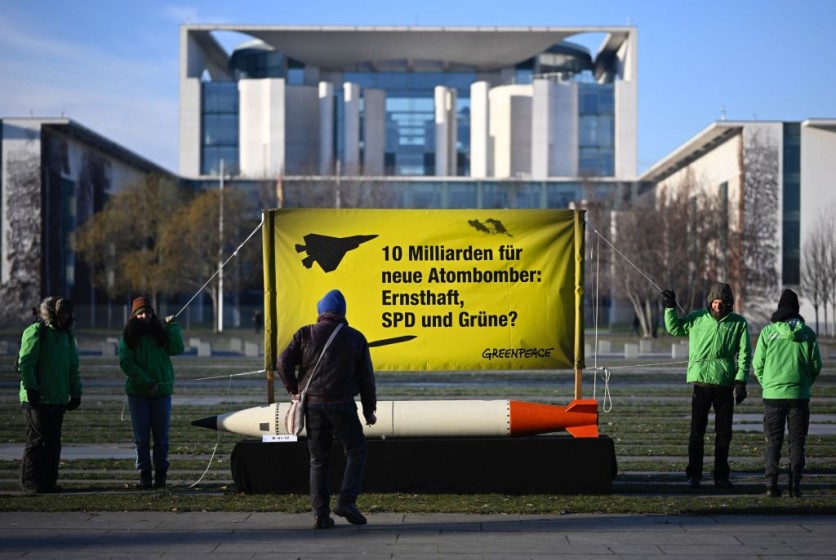A new generation of European climate activists is urging Greenpeace to reconsider its stance on nuclear power, which they view as outdated.

(Photo : TOBIAS SCHWARZ/AFP via Getty Images)
Greenpeace activists hold up a poster reading "10 billions for new nuclear bombers: Are you serious, SPD and Greens?" as they demonstrate against defence plans of the government to buy F-35 combat jets, in front of Chancellery in Berlin, Germany, on December 14, 2022.
'Dear Greenpeace' Campaign: Combating Climate Change
Through the "Dear Greenpeace" campaign, Interesting Engineering reported that activists from five EU nations are asking the respected environmental organization to support what they see as a crucial tool in combating climate change.
Ia Aanstoot, an 18-year-old climate activist, expressed a profound sense of urgency during a recent interview with "As It Happens" host Nil Köksal.
Aanstoot passionately conveyed the need for Greenpeace to join the fight against fossil fuels but emphasized that its opposition to nuclear power was "outdated."
"We are really, really desperate to have them in the struggle against fossil fuels. And it feels like a betrayal for them to be going up against nuclear power," Aanstoot noted.
Nuclear energy stands out as a low-carbon energy source with minimal greenhouse gas emissions compared to fossil fuels. However, it carries substantial environmental and safety concerns that cannot be ignored. One of the most pressing challenges associated with nuclear energy is the managing and disposing of radioactive waste.
Amid these concerns and additional factors, Greenpeace and other skeptics persist in their argument that nuclear energy presents too many drawbacks in terms of risk, environmental impact, and cost to be considered a practical solution to combat the climate crisis.
The byproducts, including spent fuel and other radioactive materials produced by nuclear reactors, pose significant threats to both human beings and the environment for thousands of years.
Safeguarding against contamination requires intricate and precise storage procedures. In addition to the waste issue, the extraction of uranium, used as fuel in nuclear reactors, involves mining and milling operations.
CBC reported that these activities often lead to habitat disruption, soil and water contamination, and health risks to miners and nearby communities, underscoring the complex environmental and social impacts associated with nuclear energy.
In the nuclear energy industry, power plants have a considerable demand for water to facilitate their cooling processes. That entails the extraction of water from nearby rivers or lakes, a practice that carries the risk of disrupting aquatic ecosystems and causing harm to marine life.
Though nuclear accidents are relatively infrequent, their potential impact is profoundly significant. Events such as the Fukushima Daiichi disaster in 2011 and the Chernobyl catastrophe in 1986 involved the release of radioactive materials, resulting in immediate and enduring contamination of the surrounding environment.
Read Also : US Scientists Hit Nuclear Fusion Breakthrough, Higher Energy Output Recorded in Experiment
Greenpeace on Nuclear Power
Amid these concerns and additional factors, Greenpeace and other skeptics persist in their argument that nuclear energy presents too many drawbacks in terms of risk, environmental impact, and cost to be considered a practical solution to combat the climate crisis.
Ariadna Rodrigo, leading Greenpeace's EU sustainable finance campaign, argued against the viability of new nuclear power plants. She emphasized the importance of swiftly reducing carbon emissions and achieving this goal cost-effectively.
Rodrigo expressed concerns that nuclear energy does not align with these critical objectives. Moreover, she asserted that nuclear energy is no longer a prerequisite in the current energy landscape.
Modern energy storage solutions have made it entirely feasible to transition to 100 percent renewable systems. Rodrigo argued that solar and wind technologies offer significantly more cost-effective and expedited routes to curb emissions than nuclear power.
"We have the greatest respect for folks who are worried about the climate crisis and want to throw everything we have at the problem, but building new nuclear plants just isn't a viable solution. The top priority is to cut carbon emissions as fast and, ideally, as cheaply as possible, and nuclear fails on both scores," Rodrigo told CBC.

ⓒ 2026 TECHTIMES.com All rights reserved. Do not reproduce without permission.




